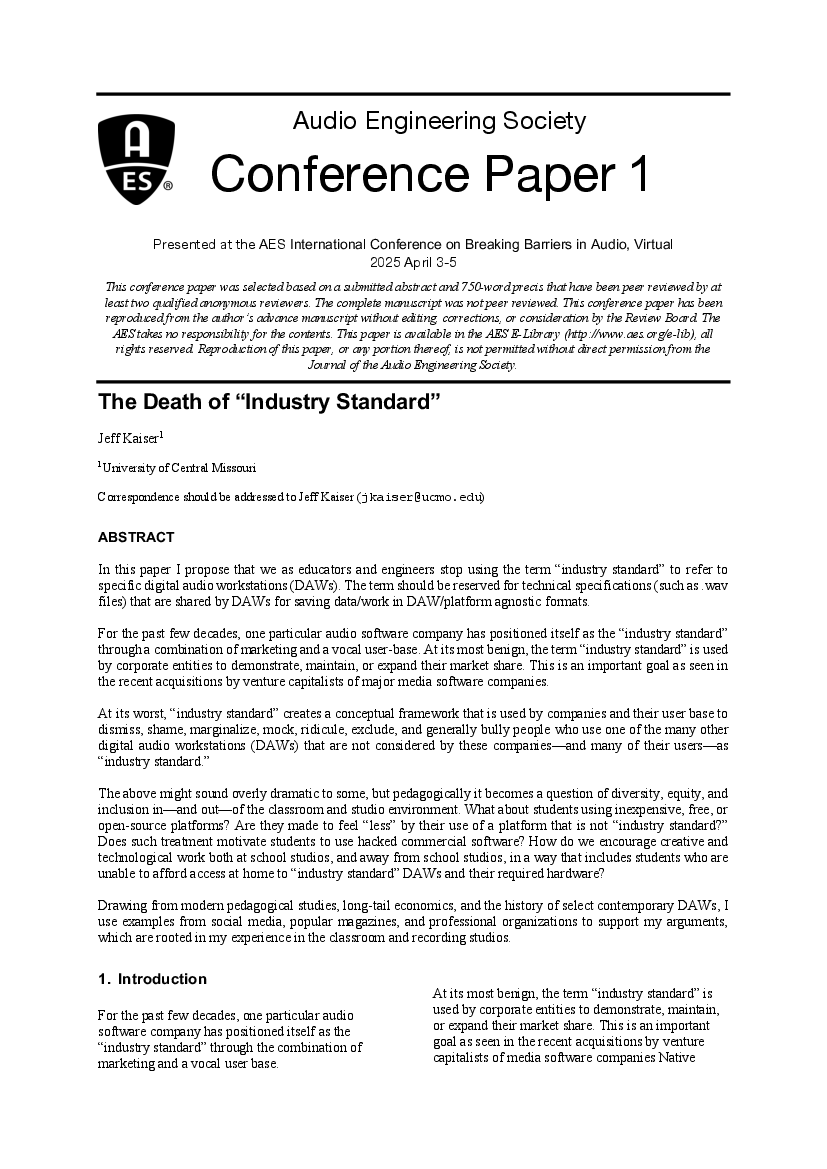Home / Publications / E-library page
You are currently logged in as an
Institutional Subscriber.
If you would like to logout,
please click on the button below.
Home / Publications / E-library page
Only AES members and Institutional Journal Subscribers can download
In this paper I propose that we as educators and engineers stop using the term industry standard to refer to
specific digital audio workstations (DAWs). The term should be reserved for technical specifications (such as .wav
files) that are shared by DAWs for saving data/work in DAW/platform agnostic formats.
For the past few decades, one particular audio software company has positioned itself as the industry standard
through a combination of marketing and a vocal user-base. At its most benign, the term industry standard is used
by corporate entities to demonstrate, maintain, or expand their market share. This is an important goal as seen in
the recent acquisitions by venture capitalists of major media software companies.
At its worst, industry standard creates a conceptual framework that is used by companies and their user base to
dismiss, shame, marginalize, mock, ridicule, exclude, and generally bully people who use one of the many other
digital audio workstations (DAWs) that are not considered by these companiesand many of their usersas
industry standard.
The above might sound overly dramatic to some, but pedagogically it becomes a question of diversity, equity, and
inclusion inand outof the classroom and studio environment. What about students using inexpensive, free, or
open-source platforms? Are they made to feel less by their use of a platform that is not industry standard?
Does such treatment motivate students to use hacked commercial software? How do we encourage creative and
technological work both at school studios, and away from school studios, in a way that includes students who are
unable to afford access at home to industry standard DAWs and their required hardware?
Drawing from modern pedagogical studies, long-tail economics, and the history of select contemporary DAWs, I
use examples from social media, popular magazines, and professional organizations to support my arguments,
which are rooted in my experience in the classroom and recording studios.
For the past few decades, one particular audio software company has positioned itself as the industry standard through a combination of marketing and a vocal user-base. At its most benign, the term industry standard is used by corporate entities to demonstrate, maintain, or expand their market share. This is an important goal as seen in the recent acquisitions by venture capitalists of major media software companies.
At its worst, industry standard creates a conceptual framework that is used by companies and their user base to dismiss, shame, marginalize, mock, ridicule, exclude, and generally bully people that use one of the many other digital audio workstations (DAWs) that are not considered by these companiesand many of their usersas industry standard.
The above might sound overly dramatic to some, but pedagogically it becomes a question of diversity, equity, and inclusion inand outof the classroom and studio environment. What about students using inexpensive, free, or open-source platforms? Are they made to feel less by their use of a platform that is not industry standard? Does such treatment motivate students to use hacked commercial software? How do we encourage creative and technological work both at school studios, and away from school studios, in a way that includes students who are unable to afford access at home to industry standard DAWs and their required hardware?
Drawing from modern pedagogical studies, long-tail economics, and the history of select contemporary DAWs, I use examples from social media, popular magazines, and professional organizations to support my arguments, which are rooted in my experience in the classroom and recording studios.
Author (s): Kaiser, Jeff
Affiliation:
University of Central Missouri
(See document for exact affiliation information.)
Publication Date:
2025-03-27
Import into BibTeX
Session subject:
Breaking Barriers in Audio
Permalink: https://aes2.org/publications/elibrary-page/?id=22824
(756KB)
Click to purchase paper as a non-member or login as an AES member. If your company or school subscribes to the E-Library then switch to the institutional version. If you are not an AES member Join the AES. If you need to check your member status, login to the Member Portal.

Kaiser, Jeff; 2025; The Death of "Industry Standard" [PDF]; University of Central Missouri; Paper 1; Available from: https://aes2.org/publications/elibrary-page/?id=22824
Kaiser, Jeff; The Death of "Industry Standard" [PDF]; University of Central Missouri; Paper 1; 2025 Available: https://aes2.org/publications/elibrary-page/?id=22824